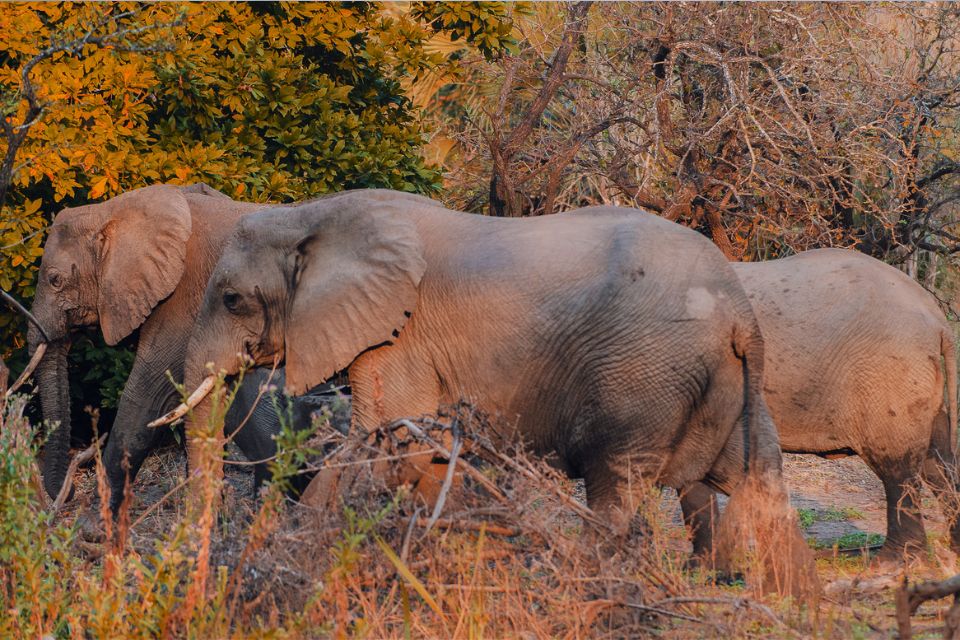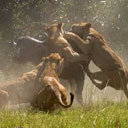Nyerere National Park

Nyerere National Park
Welcome to Nyerere National Park, a natural wonderland nestled in the heart of Tanzania, East Africa.
Named in honor of Tanzania's founding father, Julius Kambarage Nyerere, this magnificent national park is a testament to the nation's commitment to wildlife conservation, biodiversity preservation, and eco-tourism. Spanning an impressive area of over 30,000 square kilometers, Nyerere National Park stands as one of the largest and most diverse wildlife reserves on the African continent.
From sweeping savannah plains to dense woodlands, expansive wetlands, and winding riverine habitats, this park showcases the full spectrum of African landscapes. As a result, the park attracts an astonishing array of wildlife species, making it a paradise for nature enthusiasts and photographers alike. The park is renowned for its remarkable population of African elephants, estimated to be one of the largest in the world. Witness these majestic creatures roam freely across the vast plains, along with other iconic African animals such as lions, leopards, buffalo, giraffes, zebras, and hippos. Nyerere National Park is also a haven for birdwatchers, boasting over 400 recorded bird species, including vibrant flamingos, stately African fish eagles, and elusive Shoebills.
Nyerere National Park serves as a shining example of successful conservation efforts in Africa. The park's establishment in 2019 merged several previously existing game reserves, allowing for improved wildlife management and protection. The reintroduction of endangered species, such as the black rhino, is a testament to the park's commitment to preserving biodiversity and restoring natural habitats. Embark on an unforgettable journey through Nyerere National Park, immersing yourself in its awe-inspiring beauty and diverse landscapes. Discover the Great Rufiji River, the lifeblood of the park, as you venture on thrilling boat safaris or glide silently in a traditional dhow, observing the vibrant birdlife and basking crocodiles.
Introducing Nyerere National Park: The Epitome of African Wildlife Conservation.
For those seeking a more immersive experience, guided walking safaris offer an up-close encounter with nature, allowing you to track wildlife footprints, learn about traditional medicinal plants, and experience the wilderness from a different perspective. Camping under the star-studded African sky is an opportunity to connect intimately with the natural world and listen to the nocturnal symphony of wildlife.
Nyerere National Park places sustainability at the core of its operations, striving to ensure that future generations can continue to experience its wonders. The park's lodges and camps are designed with eco-friendly principles, minimizing their environmental footprint and utilizing renewable energy sources. Local communities are actively involved in tourism ventures, fostering a sense of ownership and cultivating a mutual understanding of the value of wildlife conservation.
Best Time to Visit
The best time to visit Nyerere National Park depends on your preferences and the specific experiences you seek. The park offers distinct seasons, each with its own advantages and considerations. Here are the main factors to consider when planning your visit:
Dry Season (June to October):
This period is generally considered the peak season for visiting Nyerere National Park. The weather is dry, with lower chances of rainfall, making it easier to navigate the park and spot wildlife. June and July are particularly popular months for game viewing.
Wet Season (November to May):
The wet season in Nyerere National Park is characterized by periodic rainfall. While it may seem less appealing to some, it offers unique advantages. The wet season is also the time when many herbivores give birth, resulting in an influx of adorable baby animals.
It's worth noting that the wet season is divided into two phases:
the short rains (November to December) and the long rains (March to May). If you prefer to avoid heavy rainfall and potential road closures, it's best to plan your visit during the shoulder months between the two rainy periods.
Activities
- Bird Watching
- Boating
- Game Drives
- Walking
- Cultural Tours
- Photography
Related Safari Package
TAILOR MADE HOLIDAY
IT’S TIME FOR YOUR TAILOR-MADE DREAM HOLIDAY IN AFRICA!
Testimonials
Customer Reviews.
Regardless of your situation, we can help you exit your comfort zone, like we’ve done for other people. Hear what some of them have to say:
Getting in touch is simpler than ever
Leave us your email address and we contact you back




